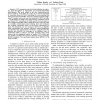58 search results - page 4 / 12 » Promote the Use of Explicit Delay Control |
ISCC
2007
IEEE
13 years 11 months ago
2007
IEEE
Abstract— Interactive and other delay-sensitive applications are interested in keeping end-to-end delays of their packets minimal. Unfortunately, congestion control offered by Tr...
SIGCSE
2005
ACM
13 years 11 months ago
2005
ACM
The University of Washington’s Classroom Presenter lecturing system enables an active lecturing environment by combining a standard electronic slide presentation format with the...
INFOCOM
2009
IEEE
14 years 4 days ago
2009
IEEE
Abstract—TCP congestion-control is fairly inefficient in achieving high throughput in high-speed and dynamic-bandwidth environments. The main culprit is the slow bandwidth-searc...
ACSAC
2002
IEEE
13 years 10 months ago
2002
IEEE
Active Spaces are physical spaces augmented with heterogeneous computing and communication devices along with supporting software infrastructure. This integration facilitates coll...
CCR
2000
13 years 5 months ago
2000
TCP congestion control 9] is designed for network stability, robustness and opportunistic use of network bu er and bandwidth resources on an end-to-end per-connection basis. Upon ...


